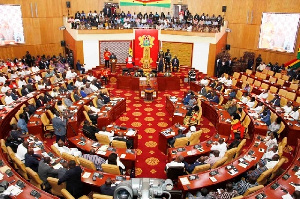 The motion is expected to regulate CSR work of companies in the country
The motion is expected to regulate CSR work of companies in the country
• 9 MPs have laid a Private Member’s motion before Parliament to regulate the CSR work of companies in the country
• The MPs were drawn from both sides of the House
• It is believed that this motion will bring an end to the knee-jerk practice of companies in exercising their CSR roles in communities
A Private Member’s motion to have Parliament pass a law that will streamline and mainstream all Corporate Social Responsibility (CSR) activities has been laid by some nine Members of Parliament.
The motion, which aims to ensure cogent, equitable, and sustainable national development, will also push for the enactment of a well-defined legal framework which will see to it that corporate bodies adhere to the best practices of CSR that will allow communities where such entities operate to reap the maximum gains, reports graphic.com.gh.
The MPs, from both sides of the House, are the Majority Chief Whip, Frank Annoh-Dompreh, who is also the MP for Nsawam-Adoagyiri; MP for Manso-Adubia, Yaw Frimpong Addo; MP for Kwadaso, Dr Kingsley Nyarko; MP for Old-Tafo, Vincent Ekow Assafuah, and the MP for Dormaa East, Paul Apreku Twum-Barimah, all from the New Patriotic Party (NPP).
Those from the opposition National Democratic Congress (NDC) are the MP for North Tongu, Samuel Okudzeto Ablakwa; MP for South Dayi, Rockson-Nelson Dafeamekpor; MP for Awutu Senya West, Gizella Tetteh Agbotui, and the MP for Techiman North, Elizabeth Ofosu-Agyare.
The report added that this motion will also target the pushing of the establishment of a specific institution whose job will be to monitor the details of what companies offer to communities as their CSR in return.
It is the hope of the MPs that this motion will bring an end to the knee-jerk practice with which businesses respond to what they must provide for communities when they agitate.
Frank Annoh-Dompreh explained that the absence of a dedicated legal framework that is “consciously dedicated” to the enforcement of such provisions in the country is the reason they are pushing this motion.
The current arrangement where only the Directive Principle of State Policy under Chapter 6 of the 1992 Constitution that pushes for CSR, he said, is not enough.
“It, therefore, has become like a knee-jerk reaction. When the community people complain then the companies come and drop anything in their pan and I do not think that is the way to go.
“We should have a well-defined legal framework which will be monitored by an institution to ensure we generate the necessary help from these corporate bodies,” he said.
Also, he pointed out that he had widely consulted the corporate world, from where they had collectively considered the urgent need for such a legislation to moderate their engagements in that respect.
“Again, giving back to the country should not be at the discretion of these companies. Why is it that a company goes to build a two-bedroom house for a whole community and they feel they have executed on corporate social responsibility?” he explained.
He further said that with Africa being at the center of the world’s attraction, including Ghana, this legislation would help “to position ourselves to rake in the needed benefits.”
